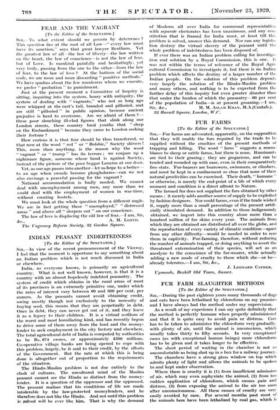FEAR AND THE VAGRANT [To the Editor of the SPECTATOR.]
SIR,--To what extent should we govern by deterrence ? This question lies at the root of all LawŌĆö" every law must have its sanction," says that great lawyer Bentham. Yet the greatest law of allŌĆöthe law of libertyŌĆöthe law written on the heart, the law of conscienceŌĆöis not' the law of fear, but of Love. Is mankind painfully and hesitatingly, yet very truly, passing from the one to the otherŌĆöfrom the law of fear, to the law of love ? At the bottom of the social scale, we are more and more discarding " punitive methods." We have qualms about the few murderers whom we execute, we prefer " probation 7 to punishment. Just at the present moment a Committee of Inquiry is sitting, inquiring into the system, hoary with antiquity, the system of dealing with " vagrants," who not so long ago were whipped at the cart's tail, branded and pilloried, and are still " pilloried " in public opinion, because ancient prejudice is hard to overcome. Are we afraid of them these poor slouching ill-clad figures that slink along our London streets, these country bred youths that " sleep on the Embankment " because they came to London seeking their fortune ?
How curious it is that fear should be thus transferred, so that now at the word " red " or " Bolshie," Society shivers ! This, more than anything, is the reason why the word " vagrant " or tramp " has its terrors ; we conjure up a nightmare figure, someone whose hand is against Society, instead of the picture of the poor beggar Lazarus at our door. Yet, as our age passes into anotherŌĆölet us hope to a betterŌĆö to an age when swords become ploughsharesŌĆöcan we not also envisage a peaceful passing for the vagrant ? National accommodation is badly needed. We cannot deal with unemployment among men, any more than we could deal with the employment of women in war-time, without creating hostels. We must look at the whole question from a different angle. We are in fact getting these " unemployed," " distressed areas " and above all " sleepers out " on our conscience. The law of love is displacing the old law of fear.ŌĆöI am, Sir,






























































 Previous page
Previous page